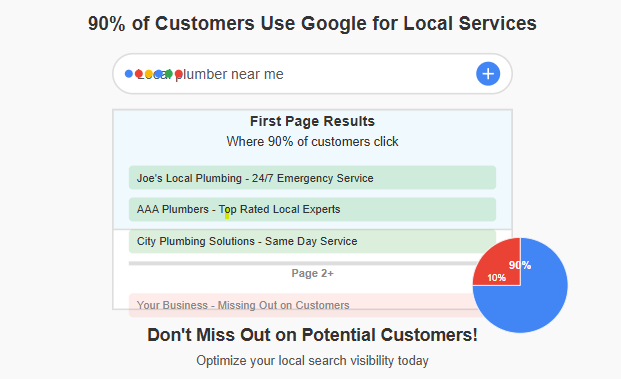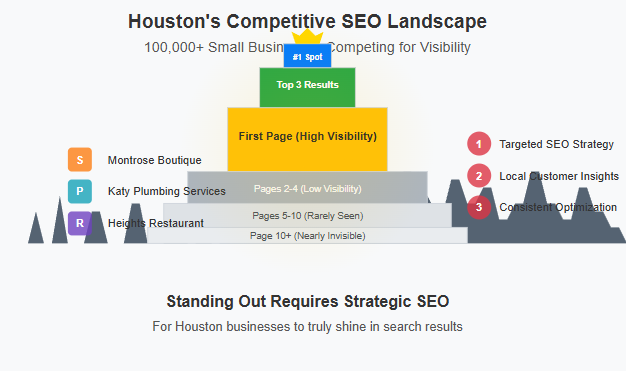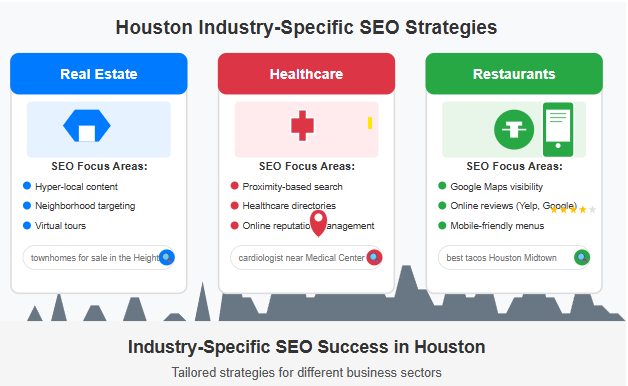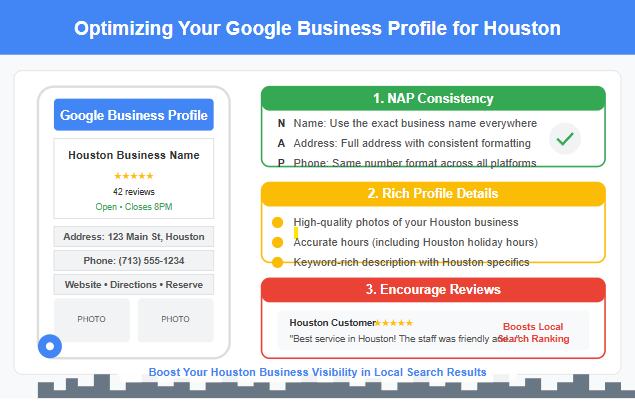Understand the process of SEO, from keywords to rankings, and how it helps Houston businesses dominate online searches.
Introduction: Understanding SEO in the Houston Market
Houston isn’t just big; it’s a dynamic hub where businesses are constantly vying for attention. In this fast-paced environment, simply having a website isn’t enough – you must be easily discoverable. That’s precisely where the power of SEO (Search Engine Optimisation) steps in. Think of it as ensuring your digital storefront stands out on the busiest street.
SEO is all about fine-tuning your website so that search engines, especially the all-important Google, rank it higher when people are searching for relevant terms. And for businesses right here in Houston, local SEO is crucial. It’s about connecting with the customers in your neighbourhood, the ones actively looking for what you offer.
What Makes Houston’s Digital Market Unique
Houston’s diverse population, sprawling geography, and wide range of industries make it a truly unique landscape for digital marketing. Unlike more homogenous markets, Houston presents a fascinating mix of needs and competitive intensities across its various sectors.
For instance, the SEO strategies that work for a major oil and gas company in Houston might be vastly different from those needed by a local restaurant in Houston aiming to attract nearby diners, or a real estate firm in Houston looking to connect with potential homebuyers in specific neighbourhoods.
Understanding these nuances is crucial, as a one-size-fits-all approach to SEO in Houston won’t cut it. Each industry demands a tailored strategy that considers its specific audience, their online search behaviour, and the local competitive environment. This is where a deep understanding of local SEO and industry-specific SEO practices for Houston businesses becomes invaluable.
Why SEO Is Crucial for Houston-Based Businesses
Over 90% of people use Google to search for local services. If your business doesn’t appear on the first page, you might miss out on many potential customers.

Overview of Local vs. Traditional SEO
Overview of Local vs. Traditional SEO. While the broader scope of traditional SEO aims for general rankings across a wider audience, local SEO takes a more targeted approach, specifically focusing on geographic keywords. Think about the difference: someone searching for “best running shoes” engages with traditional SEO, while someone typing “best dentist in Houston” or “Houston coffee shop near me” is firmly in the realm of local SEO.
This localized approach recognizes the importance of proximity and local intent. Beyond just keywords, local SEO for Houston businesses also encompasses crucial elements like Google Maps optimization, ensuring your business appears prominently in local search results and map listings.
Furthermore, customer reviews play a vital role in local visibility and trust, directly impacting whether a potential Houston customer chooses your business over a competitor.Ignoring these local-specific factors can significantly hinder your ability to connect with your target audience in Houston.
The Fundamentals of SEO
Before we discuss the nitty-gritty of Houston SEO strategies, it’s wise to step back and understand the engine that drives it all: search engines like Google. Think of them as the librarians of the internet, constantly sorting through a massive collection of information to deliver the most helpful answers to your queries. So, how exactly do they decide which websites get the top spots? Let’s take a look under the hood.
How Google Ranks Websites:
Google’s ranking system isn’t based on magic; complex algorithms drive it – a set of rules and calculations designed to determine which websites are the most relevant and trustworthy for any search query. While the exact recipe is a closely guarded secret, we know some of the key ingredients. These include:
Keyword Usage
This is still fundamental. When someone searches for “SEO services Houston,” Google looks for websites that naturally and comprehensively use these and related terms in their content. However, it’s crucial to remember that quality and context are key – simply stuffing keywords won’t cut it.
Site Speed:
No one likes a slow website in today’s fast-paced digital world. Google knows this, and a website that loads quickly provides a better user experience, thus earning a ranking boost. Think of it—would you rather wait ages for a page to load or instantly get the necessary information?
Mobile-Friendliness:
A significant portion of searches happen on smartphones (especially for local searches in Houston when people are on the go), so having a website that looks and functions flawlessly on mobile devices is non-negotiable—Google prioritizes mobile-friendly sites in its rankings.
Backlinks:
Imagine other acceptable websites confirming your content and linking to it. These “backlinks” are like votes of confidence in Google’s eyes, signalling that your website is a credible source of information. High-quality backlinks from other Houston-based businesses or relevant industry websites can significantly boost your off-page SEO.
User Behaviour:
How users interact with your website also sends signals to Google. Do they quickly leave (bounce rate)? Or do they spend time exploring your content? Positive user engagement suggests your website is providing value.
The Role of Crawling, Indexing, and Ranking: How Information Gets Organized
Think of the internet as a vast, ever-expanding library. How does Google keep track of all the books (web pages)? It uses automated programs called “crawlers” or “bots” (like Googlebot) that act as tireless librarians, constantly exploring the web, following links from one page to another.
Alright, let’s flesh out the sections on Organic vs. Paid Search and the Unique SEO Landscape in Houston:
Understanding Organic vs. Paid Search:
You have two main avenues for getting your Houston business noticed in search engine results: organic search and paid search. While both aim to increase your visibility, they operate on fundamentally different principles.
Organic search results are “earned” placements that emerge based on how effectively your website’s SEO matches search engine ranking criteria. Think of it as earning your spot through hard work, providing valuable content, and having a well-optimized website. These listings appear naturally below any paid advertisements.
Paid search results are advertisements businesses pay to appear at the top or bottom of search results pages. Platforms like Google Ads allow you to bid on specific keywords, and when someone searches for those terms in Houston or elsewhere, your ad can appear.
The Unique SEO Landscape in Houston: Navigating a City of Scale and Opportunity
Houston, one of the largest and most dynamic cities in the United States, presents a distinctive set of challenges and exciting opportunities for businesses looking to thrive online through SEO. It’s not just about applying general SEO best practices; understanding the nuances of the Houston market is key to success.
Competition Among Local Businesses in Houston: Standing Out in a Crowd
With over 100,000 small businesses calling Houston home, the competition for online visibility can be fierce. Whether you’re a boutique clothing store in Montrose or a plumbing service in Katy, standing out in the search results requires more than just a basic website.
It demands targeted SEO strategies, a deep understanding of your local customer base, and consistent effort to optimize your online presence. Houston businesses must be strategic and persistent in their SEO endeavours to shine truly.

Industry-Specific SEO Trends in Houston: Tailoring Your Approach
The diverse industries that fuel Houston’s economy also bring unique SEO trends:
Real Estate:
The highly competitive Houston real estate market means realtors need to focus on hyper-local content, targeting specific neighbourhoods and property types (e.g., “townhomes for sale in the Heights,” “condos downtown Houston”). High-quality images and virtual tours are also important.
Healthcare
For healthcare providers in Houston, patients often search for services based on proximity. Therefore, optimizing location pages (e.g., “cardiologist near the Texas Medical Centre”), ensuring accurate listings in local healthcare directories, and managing online reputation are essential local SEO tactics.
Restaurants
For the vibrant Houston restaurant scene, visibility in Google Maps, positive online reviews (on platforms like Yelp and Google), and a mobile-friendly website with easy-to-find menus and online ordering options are paramount for attracting local diners.

Opportunities to Dominate Niche Local Keywords: Finding Your Untapped Potential
Despite the competition, Houston’s size and diverse neighbourhoods offer significant opportunities to dominate niche local keywords. By targeting specific geographic areas and long-tail keywords (more particular phrases), Houston businesses can often find less competitive but highly relevant search terms.
For example, instead of trying to rank for the broad term “dentist Houston,” a practice might find more success initially by targeting “emergency dentist Midtown Houston” or “affordable family dentist in the Memorial area.” This hyper-local focus can yield highly qualified leads and help smaller businesses compete effectively against larger players.
Key Components of Effective SEO Strategies for Houston Businesses
Now that we’ve covered the fundamentals and the unique landscape of SEO in Houston, let’s get practical. What are the essential building blocks of a successful SEO strategy to help Houston-based businesses thrive online? Here are some crucial components:
Keyword Research Focused on Houston Audiences: Speaking Your Local Customer’s Language
Thorough keyword research is crucial to any successful SEO plan. However, for Houston businesses, this needs a local lens. It’s not enough to target broad industry terms; you need to understand exactly what your potential customers in Houston are searching for. This involves using specialized tools like Google Keyword Planner, Ubersuggest, or Ahrefs to uncover the specific search terms and phrases that locals use.
For example, suppose you offer SEO services, instead of just targeting that generic term. In that case, you’d want to explore more specific and locally relevant keywords like “affordable SEO services in Houston,” “best SEO company Houston TX,” or even neighbourhood-specific terms like “SEO experts in the Galleria area.”
Understanding this local search intent is crucial for attracting the right traffic to your website – the type that’s most likely to convert into customers.
On-Page SEO: Optimizing Your Digital Real Estate for Houston Visibility
Once you know the keywords your Houston audience uses, the next step is to optimize your website. This is where on-page SEO comes in, focusing on elements that you have direct control over:
Title tags and meta descriptions
Title tags and meta descriptions are short pieces of text that appear on search engine results pages (SERPS). Crafting compelling titles and meta descriptions that include relevant Houston-specific keywords (e.g., “[Your Service] in Houston—[Your Business Name]”) can significantly improve your click-through rates and help search engines understand the local relevance of your pages.
Content Localization:
Your website should naturally incorporate location names and references relevant to Houston. If you serve multiple areas within the city, consider creating specific service pages for each (e.g., “[Your Service] in Downtown Houston,” “[Your Service] in West University”). This helps you target those niche local keywords we discussed earlier.
Structured Data (Schema Markup):
This is like providing extra information to search engines about your content in a format they understand. For local SEO, implementing local business schema can help Google display rich snippets in search results, such as your address, phone number, business hours, and even customer ratings, making your listing stand out to Houston searchers.
Off-Page SEO: Building Authority and Trust in the Houston Digital Ecosystem
On-page SEO gets your house in order, but off-page SEO is about building your reputation and authority across the web. Backlinks, or links from other websites to yours, are like votes of confidence. When reputable websites, especially those with a local connection, link to your site, it signals to Google that your content is valuable and trustworthy within the Houston online community.
Aim to get featured in:
- Local Houston blogs that cover your industry or community events.
- Houston-based business directories (we’ll discuss specific ones later).
- Local Houston news outlets, if you have a noteworthy story or expertise to share.
These backlinks from Houston sources drive referral traffic and significantly boost your website’s authority in search engines for local queries.
Technical SEO Essentials for Local Performance: Ensuring a Smooth User Experience
Mobile-Friendliness
A responsive website that adapts seamlessly to different screen sizes is crucial, especially for attracting local Houston customers who often search on their phones. Google prioritizes mobile-friendly websites.
Improve Site Loading Speed
Slow websites frustrate users and can negatively impact your rankings. As Google recommends, aim for a loading speed of under 2.5 seconds to provide your Houston audience a smooth and efficient experience.
Use HTTPS for Security
An SSL certificate (indicated by “HTTPS” in your website address) encrypts the connection between your website and visitors, protecting their data. This is a basic security standard that Google considers a ranking factor.
By focusing on these key components, Houston businesses can build a robust SEO strategy that improves their visibility in local search results and provides a positive and trustworthy experience for their target audience.
Local SEO Best Practices: Your Key to Connecting with Houston Customers
Local SEO presents a significant opportunity for many Houston businesses to connect with nearby customers who are actively searching for their products or services. Here’s how to tailor your approach for the Houston audience:
Optimizing Your Google Business Profile (GBP) for Houston Searches:
Your GBP is your digital storefront on Google. To optimize it for Houston:
NAP Consistency
Make sure your business’s Name, Address, and Phone Number (NAP) are consistent across all internet platforms. Inconsistent data might confuse search engines and customers.
Rich Profile Details
Add high-quality photos of your business, accurate business hours (including any special Houston-specific holiday hours), and a comprehensive, keyword-rich description highlighting what makes your Houston business unique.
Encourage Reviews
Ask satisfied Houston customers to leave reviews on your GBP. Positive reviews significantly boost your visibility and credibility in local search results.

Getting Listed in Houston-Specific Online Directories:
Beyond Google, ensure your business is listed in relevant Houston-focused online directories. These can include:
- Yelp Houston: A popular platform for local business reviews.
- Houston.org: The official website of the Greater Houston Partnership.
- Better Business Bureau (BBB): Enhances trust and credibility.
- Industry-specific directories relevant to your Houston sector.
Consistent listings across these sites improve your local SEO and make it easier for Houstonians to find you.
Generating and Managing Local Reviews:
Reviews are essential for establishing trust and affecting local search rankings.
- Proactively Ask: Politely request reviews from happy Houston customers after a positive experience.
- Respond Thoughtfully: Address all positive and negative reviews professionally and promptly. This shows you value customer feedback.
- Aim for Quantity and Quality: Strive for a consistent stream of genuine reviews. Aim for an initial 10-20 quality reviews to gain noticeable traction in the Houston market.
Using Schema Markup for Local SEO:
Implement local business schema markup on your website’s code. This helps search engines understand key details about your Houston business, such as your name, address, phone number, hours, and even reviews. It allows them to display this information as rich snippets in local search results, making your listing more eye-catching to Houston searchers.
Measuring SEO Success: Metrics and Tools for Businesses in Houston
Tracking your progress is essential for long-term success.
Key Local SEO Metrics to Track (Traffic, Rankings, Conversions)
- Organic traffic: Are more people visiting from search engines?
- Keyword rankings: Are you climbing up the rankings?
- Conversions: Are searchers turning into customers?
Using Google Analytics and Google Search Console Effectively
- Google Analytics: Tracks user behaviour, bounce rate, and conversions.
- Google Search Console: Monitors indexing issues, impressions, and click-through rates.
Tools for Tracking Local Keyword Performance in Houston
- BrightLocal: Great for local ranking reports.
- Moz Local: Helps manage directory listings.
- SEMrush or Ahrefs: are useful for in-depth keyword and backlink analysis.
Conclusion
If you’re a business owner in Houston, mastering SEO can increase your visibility and revenue. While it may seem overwhelming initially, starting with the basics and gradually implementing local strategies can lead to consistent growth.
By focusing on local keyword optimization, creating high-quality content, improving your technical setup, and leveraging platforms like Google Business Profile, you’ll be well-positioned to succeed in Houston’s dynamic market.
And remember: SEO is not a one-time task. It requires ongoing effort, updates, and adaptation—but the results are worth it. Want to dominate the Houston market? Start with SEO.
Frequently Asked Questions (FAQS)
1. What is local SEO, and how is it different from regular SEO in Houston?
Local SEO optimizes your business for searches in a specific geographic area, like Houston. Unlike general SEO, it includes map listings, location-based keywords, and local reviews, which target broader audiences.
2. How long does it take to see SEO results in Houston?
SEO is a long-term strategy. Most Houston businesses begin seeing noticeable improvements in 3 to 6 months, depending on competition, keyword difficulty, and the quality of SEO work done.
3. Is SEO truly vital for small businesses in Houston?
Yes. With thousands of local businesses competing online, SEO helps smaller companies gain visibility, attract local customers, and effectively compete with larger brands.
4. What are the best tools for tracking local SEO in Houston?
Some top tools include Google Analytics, Google Search Console, BrightLocal, and SEMrush. These help monitor rankings, traffic, and local performance.
5. How much does SEO cost in Houston?
SEO costs vary based on scope and competition. Small businesses might spend $500–$1,500 monthly, while larger or more competitive campaigns can go higher.
